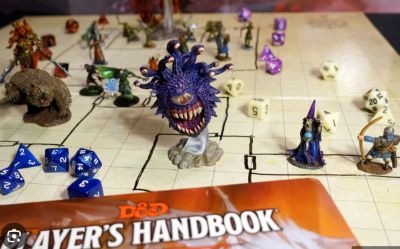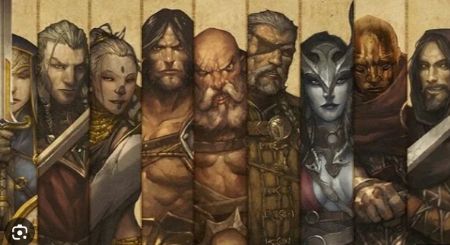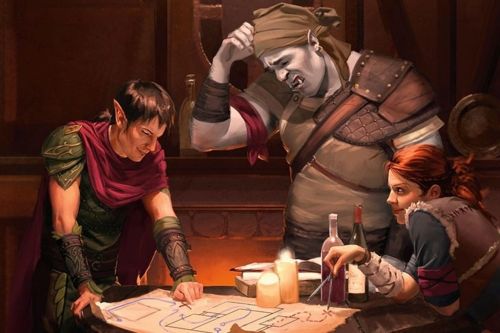Of course, I talk about Dungeons and Dragons a lot on this blog. But to someone who has never played it doesn’t necessarily make a lot of sense. Perhaps you’ve heard the stories. Brave adventurers. Dangerous dungeons. Dragons that blot out the sun. But how does it work? We’ll look at how to play Dungeons & Dragons, in particular 5th Edition (5e), the most popular version of the game.
This guide walks you through the basics so you can jump into your first adventure with confidence.
What is Dungeons & Dragons?
Dungeons & Dragons (D&D) is a tabletop role-playing game where players work together to tell a fantasy story.
One player, the Dungeon Master (DM), describes the world, controls monsters and non-player characters, and sets challenges. The rest of the players create characters—heroes that explore, solve problems, fight enemies, and shape the story through their choices.
Instead of a board or video game controller, you use:
- Your imagination
- A character sheet
- A set of dice
- A lot of conversation
There’s no “winning” or “losing” in the traditional sense. The goal is to create an exciting story together.

What You Need to Play
To get started with D&D 5e, you’ll need just a few things:
- Players: Usually 3–6 people (plus a DM)
- Dice: A set of polyhedral dice (d4, d6, d8, d10, d12, and d20)
- Character sheet: Either printed or digital
- Rulebook access: The Player’s Handbook or basic rules online
- Something to write with – a pencil and eraser are best, there’s always something to change
- Snacks (strongly recommended)
Some groups use maps and miniatures, while others prefer “theatre of the mind” where everything happens through description.

Step 1: Creating a Character
Your character is your alter ego and avatar in the world of D&D. They might be a noble paladin, a sneaky rogue, a powerful wizard, or anything in between.
To create one, you’ll choose:
1. A Species
This is your character’s fantasy species (such as Human, Elf, Dwarf, Halfling, Dragonborn, etc). Each one gives you special abilities and traits.
2. A Class
This defines what your character does:
- Fighters and Barbarians excel in combat
- Wizards and Sorcerers use magic
- Rogues rely on stealth and precision
- Clerics and Paladins draw power from faith
- Bards, Rangers and others fill versatile roles
3. Ability Scores
There are six core abilities:
- Strength (physical power)
- Dexterity (speed and agility)
- Constitution (endurance)
- Intelligence (reasoning and memory)
- Wisdom (perception and insight)
- Charisma (force of personality)
These scores influence how good your character is at different tasks.
4. Background & Personality
These aren’t stats but let you begin shaping who your character is and how they might react to the world. Answer questions like these help with this:
- Where are you from?
- What motivates you?
- What do you fear?
These details shape how you’ll roleplay your character.

Step 2: How the Game Actually Works
D&D is played through a cycle of:
- The DM describes a situation
- The players describe what they want to do
- The DM asks for a dice roll (if needed)
- The result determines the outcome
Example:
DM: “You come to a locked wooden door at the end of the corridor.”
Player: “I try to pick the lock.”
DM: “Roll a Dexterity check.”
(Dice roll determines success or failure.)
Most actions in the game use a d20 roll:
d20 + ability modifier + proficiency bonus (if trained)
If your total equals or exceeds the required number (called the Difficulty Class or DC), you succeed.
Combat Basics (Without the Overwhelm)
When fighting breaks out, the game switches to combat rounds. Each round represents roughly 6 seconds in the world.
Here’s the basic flow:
- Roll initiative (a Dexterity check) to determine turn order
- On your turn, you can:
- Move
- Take one action (attack, cast a spell, help an ally, etc.)
- Possibly use a bonus action (if you have one)
- Use a reaction when triggered
You roll to hit, roll for damage, and describe what happens cinematically.
Combat continues until the threat is dealt with, escaped, or negotiated with.
Roleplaying: The Heart of the Game
D&D is as much about storytelling as it is about rules.
You don’t just say:
“I roll Persuasion.”
You say:
“I step closer to the guard, lower my voice, and say, ‘If you let us through, no one needs to know you ever saw us.’”
The dice then determine how well you pull it off.
This is where the magic happens—your character’s voice, choices, mistakes and heroics bring the world to life.
Working as a Party
You are not competitors. You are a team.
Every character brings something different:
- One might be strong in combat
- Another might solve puzzles
- Another might negotiate and read people well
Success in D&D comes from communication, creativity, and cooperation.
Some of the most memorable moments come from unexpected plans, clever teamwork, and hilarious failures.

The Most Important Rule of All
More important than any mechanic or rule is this:
Dungeons & Dragons is meant to be fun.
The best groups aren’t the ones who know every rule. They’re the ones who:
- Support each other
- Share the spotlight
- Embrace the story
- Laugh at bad dice rolls
- Celebrate each other’s wins
If everyone is having fun, you are playing it correctly.
Step 3: Ready to Start?
Grab some friends. Grab the basic rules for free. Roll some dice. Create a hero. Make terrible decisions. Save a village (or accidentally burn it down).
Welcome to Dungeons & Dragons.



